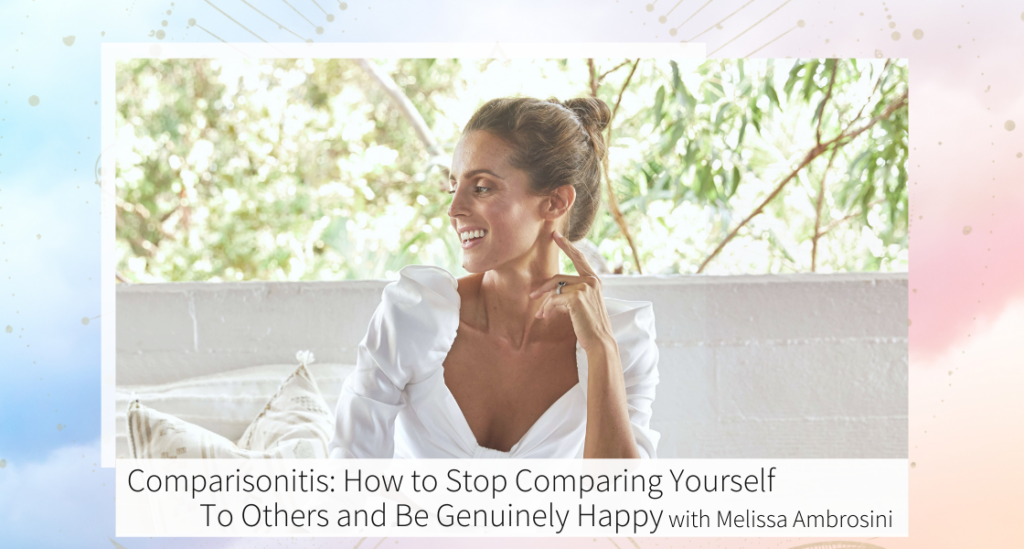[fusebox_track_player url=”https://taylorsimpson.com/wp-content/uploads/2021/05/ATA_-EP238_-Incorporating-Feminine-Energy-into-your-Business-with-Anna-Nassery-51321-9.11-PM.mp3″ image=”https://tsimpson12.wpengine.com/wp-content/uploads/2020/05/podcast-photo.jpg” artist=”Taylor Simpson” title=”Comparisonitis: How to Stop Comparing Yourself To Others and Be Genuinely Happy with Melissa Ambrosini : Episode 274″]
Hi sister! Welcome back to another episode of a Taylored Adventure to Happiness. If you are new, welcome! If you are a regular, you know I love you!
I’m so excited to share this juicy scoop episode about such an important and relevant topic today: comparisonitis. You know what I mean — it’s that feeling you get when you’ve been scrolling too long through image after image of seemingly perfect bodies and lives. We all know how bad that can feel, how much it can lower your vibes and drag you down. But if you’re on board with manifesting your highest vision of yourself, you don’t have time for that!
It’s easier said than done, I know — we’re virtually saturated with social media feeds. It takes real self-control to stop the habit of comparison, but I know it can be done. It’s so worth it because you don’t need anything standing in the way of being your best. We’re all on different paths; we have different experiences, gifts, and talents. Your job is to be the best version of yourself, sister!
I spoke with an amazing soul sister — Melissa Ambrosini, author of Comparisonitis: How to Stop Comparing Yourself to Others and Be Genuinely Happy. Melissa is on a mission to help you take back control of your mind, remember your worth, and eliminate the habit of comparison. She shares some of her own story in her book, which I found so impactful!
While comparisonitis may sound trivial, it’s genuinely not. Melissa and I talked about how the influx of social media can drive intense emotions like depression and anxiety and what we can do to stop our negative comparisons in their tracks.
Who Is Melissa Ambrosini?
Melissa is a true rock star who totally embodies the principle that you create your own reality. She’s a best-selling author, fellow podcaster, coach, and motivational speaker who has been named a “self-help guru” by Elle Magazine. She specializes in helping people develop self-love, master their inner critics, and create the beautiful lives they desire.
Her path to self-development began when she experienced a crisis due to a lifestyle that no longer aligned with her. Like many healers, she had to help herself first before she could share the amazing wisdom and guidance that she shares with so many people today. Now, she serves as an example for those ready to take back the power in their lives.
Comparisonitis: The Sickness of the Social Media Age
It’s no secret that social media usage is rampant, but no matter how many studies are done on its negative effects, it’s almost impossible to escape from. We use it to build community, to connect with audiences, and to express ourselves. So it does have some really positive benefits!
At the same time, it can be really detrimental to our mental health. And while it’s important to millennials, it’s likely to become even more impactful to younger generations.
“I’m really concerned for future generations because anxiety is through the roof. Panic attacks are through the roof, depression is through the roof and suicide is through the roof now more than ever. And I think that comparisonitis plays … a big role in that.” – Melissa Ambrosini
How does social media affect your emotional world? Does it make you feel like you should have achieved certain things by now and you haven’t? Maybe you thought you’d have kids by now or the perfect husband. Maybe you wish you could take a vacation with your friends. Does it make you feel like a boss babe or does it drag you down, dim your light, or distract you?
The Impact of Influencers
Of all the social media that we consume, influencers have one of the biggest impacts on the psyche. We’ve all seen the beauty influencers, the fashion influencers, the digital nomads, and the health gurus with picture-perfect backgrounds. But what we forget is that those photos weren’t taken on a whim. They were highly curated and planned, often using professional photographers, special equipment, gifted clothes and beauty products, and even fake sets. An influencer posing at a pool party in what appears to be a Hollywood mansion could easily have rented the space, rented their jewelry, and paid a photographer. Melissa wants us to remember that:
“This is their livelihood. And just like … an artist would put together a portfolio and present their best work, or an actor would put together their best pieces for a showreel to submit to casting directors. Influences on Instagram … put up their best stuff because that’s how they get jobs. And I think we are conditioned to forget that, … but we need to remind ourselves of that.” – Melissa Ambrosini
Influencers make money by appearing flawless on social media. They design their posts to invite interest and intrigue, giving brands notoriety — and brands pay influencers well for this attention. So, there’s an incentive to be perfect.
“You know, they have thought about things like lighting and professional hair and makeup, and maybe they’ve got awesome camera angles, or maybe their partner is a photographer or something like that. Or maybe they get loaned the wardrobe, and maybe they do airbrushing and things like that. So understanding the tricks of the trade is really important.” – Melissa Ambrosini
I asked Melissa what advice she’d give to someone who is looking at an Instagram feed and not feeling good about themselves. Her first hack for battling comparisonitis is to just be aware of this fact: that being an influencer is a job. So every time you see an influencer’s post, be aware that they created that post much like one might create a movie set.
Is every yogini dressed in the most perfect, most flattering outfit possible every time she does yoga? Are all spiritual influencers meditating on a beautiful beach at sunset every day? Of course not! It may have been designed to look really natural, really candid, and unexpected. But believe me — it’s not.
Comparisonitis Hack: Zoom Out
The second hack Melissa shared in our interview is what she calls “zooming out.” It’s understanding that there are all sorts of stuff going on in the background that we don’t know about — whether it’s kids yelling in the background, a fight someone just had with their husband, or a travel trip gone wrong. Take a moment to pull back from that single perfect snapshot and picture what’s really going on.
“I love following foodies on Instagram … And you know, you see this beautiful … chocolate cherry vegan, delicious organic pie, … [and] you don’t see all the mess around it. … You don’t see the outfit changes because there’s like chocolate stains all over it. You don’t see the kid in the corner having a tantrum cause they want a piece of the pie. You don’t see … everything else, you know, maybe there’s books everywhere.” Melissa Ambrosini
Some of those Instagram feeds are just so pretty, right? I’ll admit that I love looking at food porn as much as anyone. It’s just so enticing to look at pastel-colored cakes decorated with herbs and flowers, presented by a smiling woman in a cute dress clipping herbs from her stunning garden. But if we take a cue from Melissa, we can remind ourselves that the baker may or may not actually own that garden. Her kitchen might be a little run-down. Or maybe her baking got interrupted by a family member calling in distress.
So, when you find yourself comparing yourself to a perfect Instagram photo, remind yourself that you’re not seeing the entire picture.
Revel in Realness
I absolutely loved Melissa’s third hack for combating comparisonitis:
“When picture-perfect images trigger you to feel bad or down about yourself, … ask yourself, ‘What can I do right now to connect with the roar and the realness of my own life?’ So like coming back to my senses and what’s really important to me at this moment. … I’m looking at this image, and it’s triggering me to feel something. Maybe I’ve forgotten … to zoom out and remember there’s a whole other story there. But [I need] to take my attention away from this image and come back to, well, ‘What is really bringing me joy in my life right now and where am I [and] what really matters?’” – Melissa Ambrosini
A thousand times yes! It’s all about connection to yourself, about coming back to your own light, raising your vibes again and again. It’s so easy to go into this weird, warped zone when we’re online and forget the most simple things, like where we physically are in space. Where we mentally are.
Sister, I invite you to try this for yourself. Come back to the present moment, come back to what’s important in your life. Know it, own it. This can stop a negative spiral in its tracks!
Healthy Comparison vs. Unhealthy Comparison
Ok, so you might be thinking, “Sometimes comparison is good for me! Sometimes it motivates me, makes me want to do better, be better, and achieve more. So where’s that line of differentiation, where do you draw the line between what’s good and bad?” Melissa shared an example of healthy comparison:
“Let’s say you’re at the gym and you’re running on the treadmill and someone comes and jumps on the treadmill next to you. And they … put the speed up really high, and they own this incline. And you’re like, ‘Oh my goodness. Okay.’ And you look at them and you compare yourself to them, but you’re inspired you like, ‘Oh, okay. I’m going to … see if I can go faster and higher,’ and you get inspired.” – Melissa Ambrosini
Now let’s take a look at unhealthy comparison:
“I’m so unfit. I’m so unhealthy. I’m a fat blob. I shouldn’t have eaten that chocolate cake last night.” – Melissa Ambrosini
I know, I know — pretty straightforward right? Yet, how many of us are guilty of giving into that inner mean girl? When you actually look at the words it’s kind of shocking. Would you ever say that to a friend?
Transforming Unhealthy Comparison into Healthy Comparison
Sometimes these habits are so ingrained that our mind is already going there before we have a chance to notice and stop it. But Melissa shared that it is possible to shift states from negative to positive when feeling comparison.
“Whenever you feel yourself sliding into comparison, … use it as inspiration. What do I see in that person that is triggering me to compare myself? What is it? Is it their confidence? Is it … their relationship? Is it their health and how much they care for their body? Is it their traveling? … So I always like to … dig deep, go digging, like put on your little detective hat and go digging. And [ask], ‘Why is this triggering me? And what does that mean for me?’ Because there’s always nuggets of gold when we do that.” – Melissa Ambrosini
And it’s more than a simple mindset shift! You can completely transform the direction of your vibes and your frequency. So instead of spiraling downward and losing energy, you actually gain new wisdom and insights about yourself. And when we heal this way, it can release trapped energy inside us, opening up the door for new opportunities and better self-love practices.
Signs That Comparisonitis Is Affecting You
Not sure if you’re suffering from Comparisonitis? Melissa shared some of the other ways it can impact our lives other than making us feel down.
“When we’re comparing ourselves, it puts us in our head, the toxic self-talk starts, and we feel stuck, right? We feel stuck. ‘I don’t know what to do. Should I go here or should I do that? Or should I stop this business? Should I stop this program?’ You know, those sorts of things. So if you’re feeling stuck, … maybe ask yourself, ‘Am I comparing myself to someone else?’” – Melissa Ambrosini
In other words, Comparionsitis causes paralyzing self-doubt — the kind that totally derails your plans. It can also cause you to feel left behind:
“Whether that’s feeling behind in your career or feeling behind in your relationship. … ‘Oh, my friends are getting engaged and married, and I’m still single.’ Or, … ‘All my friends are having babies, and I’m not there yet.’” – Melissa Ambrosini
This is a recipe for trying to follow someone else’s path instead of our own, which is not aligning you to your highest self. It also both feeds off of and fuels self-consciousness. Instead of doing things for ourselves, we’re constantly doing things for others. We want to look good, sound good, do good to impress people, and we get hooked on praise and afraid of criticism:
“Extreme self-consciousness … [is] questioning everything that you do. Oh, you know, ‘Are they approving of me? Like, oh, was that good? … Was that good enough?’ You know, that sort of thing.” – Melissa Ambrosini
Choose Self-Love Over Comparisonitis Today!
Melissa shared that at its core, self-love is the force that can mitigate the negative effects of comparison. Deep self-love, meaning you show up for yourself, you refuse to abandon yourself, you don’t trash yourself no matter where you’re at.
I’m so on board with that. Sister, don’t forget to grab Melissa’s book and follow her on Instagram. Let’s heal together as sisters, stop comparing and competing with each other, and celebrate each other’s queendom.
I hope this message hits home for you! If it did, let us know on Instagram! Tag Melissa, @melissaambrosini, and me, @iamtaylorsimpson, and let us know how you’re healing from Comparisonitis! You can also share this message with someone you feel needs to hear it.
Remember, I love you. I see you. Cheers to overcoming our insecurities and owning our worthiness no matter what. And remember — Always choose happiness because, well, why the fuck not?

In Today’s Episode You Will Learn:
- What called Melissa to birth her new book Comparisonitis
- Shifting out of comparisonitis
- How social media plays a big role in this society
- Power strategies to stop comparing yourself to influencers
- Healthy vs Unhealthy comparison
- 10 signs you may have comparisonitis
- How to be a model to your kids
- Feeling behind in your career
- Feeling comparisonitis around pregnancy
- Triggers are a reflection of what you’re suppressing
- It’s time to start loving yourself fully
Connect with Melissa:





